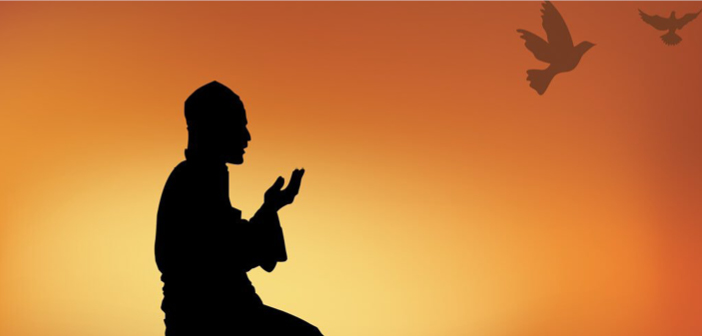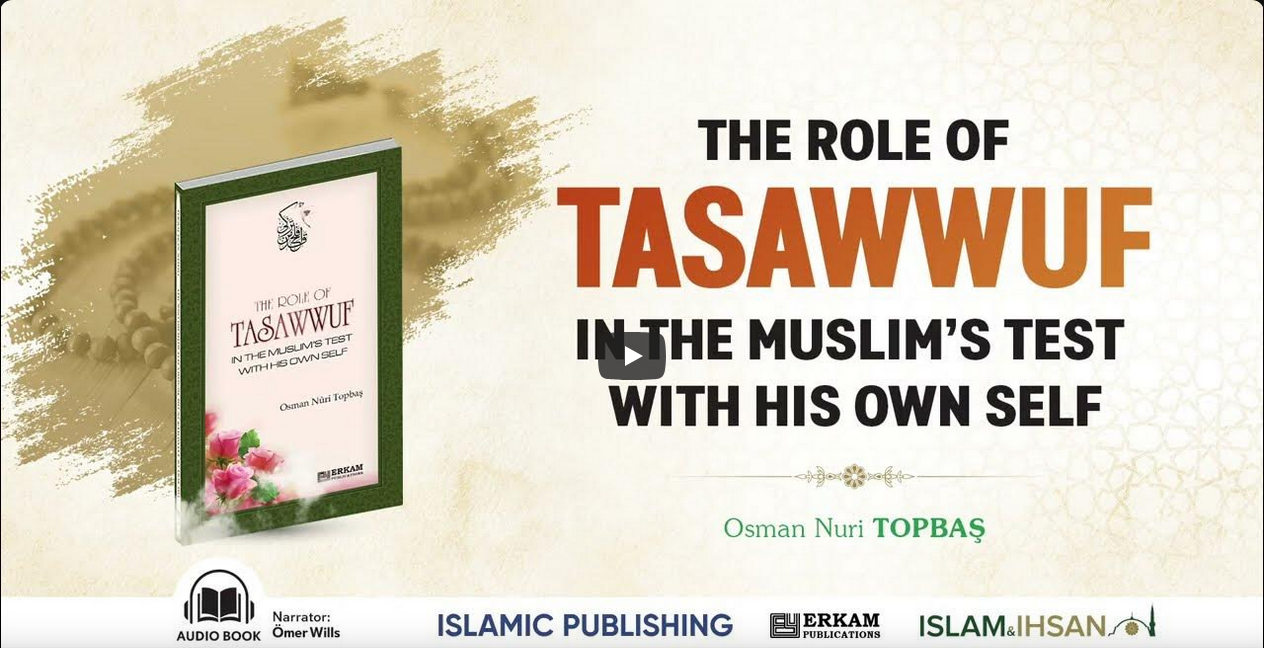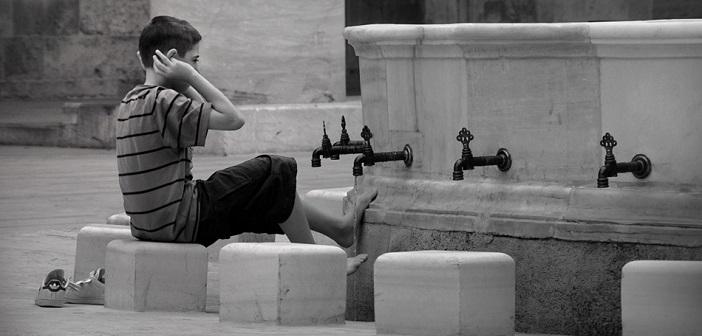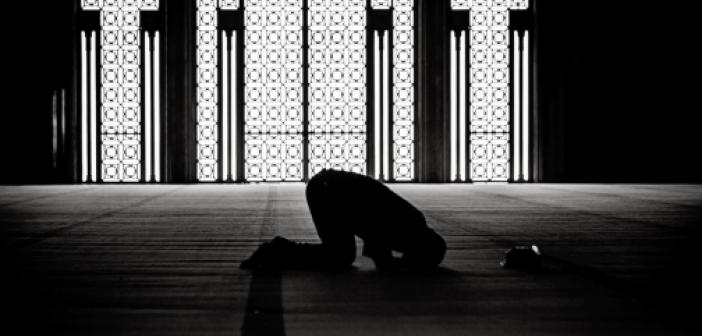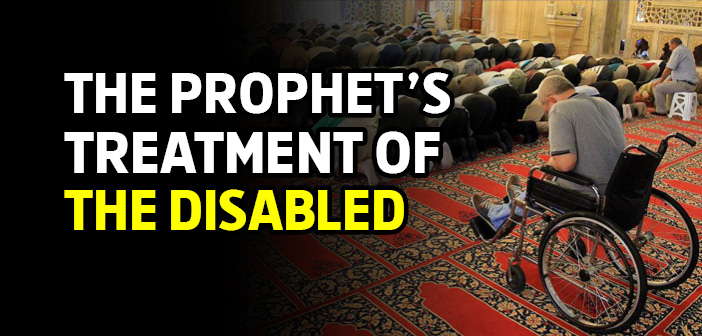
The Prophet’s Treatment of the Disabled
How was the prophet muhammads treatment of the disabled?
“Allah the Almighty said, ‘If I deprive my slave of his two beloved things (i.e., his eyes) and he remains patient, I will let him enter Paradise in compensation for them.’” (Bukhari, Marda, 7)
Disabled people are also among the unjustly treated groups in a society. When we consider the sayings of the Prophet (pbuh), we can examine the disabled people in two groups: those who are mentally disabled and those who are physically disabled. Blind people occupy a considerable place among the prophetic sayings about physically disabled people, although the Holy Qur’an usually talks about spiritual blindness when it refers to blindness. The eightieth chapter of the Qur’an expresses the rights of disabled in general and the rights of the blind in particular. It also invites the believers to be careful about the disabled as follows:
“He frowned and turned (his) back, because there came to him the blind man. And what would make you know that he would purify himself, or take heed and so the reminder might avail him? As for him who considers himself free from need of you, to him do you address yourself? And no blame is on you if he would not purify himself. And as to him who comes to you striving hard, and he fears, from him will you divert yourself.” (Abasa 80; 1-10)
The following incident is reported as the reason for the revelation of these verses:
One day, Messenger of Allah (pbuh) was chatting with prominent members of Quraish, including Utba b. Rabia, Abu Jahl, and Umayya b. Halaf. He was hopingto convert them to Islam and doing his best to achieve this. Just then, Abdullah b. Ummi Maktum (r.a.), a blind Companion, approached the Prophet (pbuh):
“O Messenger of Allah! Teach me from what Allah has taught you.” He even repeated this request for a few times for he could not see the Prophet’s guests.
Allah’s Messenger (pbuh), who was annoyed by the interruption, manifested his displeasure and turned his face away from the blind man. Then he continued to talk with his guests, because these respected people expected to receive special treatment. When the Prophet (pbuh) was about to leave, the above mentioned verses were revealed. After that he (pbuh) asked Ummi Maktum (r.a.) about his health and complemented him. And from time to time Allah’s Messenger (pbuh) addressed him saying:
“O man, because of whom my Lord reproached me!” (Razi, XXXI, 50)
The Prophet (pbuh) sent this Companion, who was one of the early Muslims, to Medina to teach the Qur’an to the new converts. The Medinan Bara’ b. Aiz (r.a.) said:
“The first believers who emmigrated to our town were Mus’ab b. Umair and Ibn Ummi Maktum (r. anhuma). There they taught the Holy Qur’an to the public.” (Bukhari, Manakib al-Ansar, 46)
Abdullah b. Ummi Maktum, who also served as the Prophet’s muezzin along with Bilal al-Habashi (r.a.) (Ibn Sa’d, IV, 207), presented his blindness, the distance of his house from the mosque, and the lack of anyone to take him to the mosque as an excuse to the Prophet (pbuh). He then asked permission from Allah’s Messenger (pbuh) to conduct his prayers in his house. He (the Holy Prophet) granted him permission. Then, when Ummi Maktum turned away the Prophet (pbuh) called to him and asked:
“Do you hear the call to prayer?” He said:
“Yes, I do.” He (the Holy Prophet then) said:
“Respond to it and come to the congregation.” (Muslim, Masajid, 255; Abu Dawud, Salat, 46)
Beside its emphasis on performing prayers in congregation, this tradition also shows how the Messenger of Allah (pbuh) tried to keep a blind person in congregation and did not let him isolate himself from society.
When the Prophet (pbuh) left Medina for certain reasons, he sometimes appointed Ibn Ummi Maktum (r.a.) to lead the prayers on his behalf. There are reports that this took place thirteen times. (Ibn al-Athir, Usd al-Ghabah, IV, 264)
Islam does not hold disabled people responsible from what they cannot do. It does not require, for instance, for them to join the army. When the verse “Those of the believers who sit still and are not on an equality with those who strive in the way of Allah with their wealth and lives…” (al-Nisa 4; 95) was revealed, Ibn Ummi Maktum went to the Prophet (pbuh) and explained that he could not fight because of his blindness. As a result of which, the following part of the verse was revealed: “Those of the believers who sit still, other than those who have a (disabling) hurt …” (al-Nisa 4; 95) (Bukhari, Tafsir, (4) 18)
Thus, the Messenger of Allah (pbuh) exempted the disabled from joining the army but let those who insisted to come. For instance, Amr b. Jamuh (r.a.), the leader of the Salama clan, was crippled but he wanted to attend to the Battle of Badr. However, the Prophet (pbuh) did not give him permission. Amr then wanted to join the Battle of Uhud. His sons tried to stop him saying:
“Allah the Almighty has exempted you from fighting.”
Thereupon, Amr went to the Prophet (pbuh). Allah’s Messenger told him that he was excused because of his disability. But upon Amr’s insistence, he said to Amr’s sons:
“Do not prevent your father from going to battle. Allah may bestow martyrdom upon him.”
This exited Companion attended the Battle of Uhud and said during the battle: “By Allah I miss Heaven.” Finally he was martyred with one of his sons, who was trying to save his father. (Waqidi, I, 264-265; Ibn al-Athir, Usd al-Ghabah, IV, 208)
During Omar’s caliphate, wearing armor and carrying a black flag, Ibn Ummi Maktum (r.a.) also joined the Muslim army in the battle of Qadisiyah. According to a report he became a martyr in this battle and according to another report he passed away when he returned to Medina. (Ibn Sa’d, IV, 112; Ibn al-Athir, Usd al-Ghabah, IV, 264)
Allah’s Messenger (pbuh) emphasized that the disabled will obtain the same rewards as those who join the army, as long as they have the intention to join it.
It was narrated by Anas (pbuh):
While the Prophet was in a Ghazwa he said:
“Some people have remained behind us in Medina and we never crossed a mountain path or a valley, but they were with us (i.e. sharing the reward with us), as they have been held back by a (legal) excuse.” (Bukhari, Jihad, 35)
Allah’s Messenger (pbuh) also advised disabled people not to rebel because of their disabilities and show patience for the blessings that other people had. In this way he noted that they could gain Paradise. Anas b. Malik (r.a.) reported that he heard from the Messenger of Allah saying:
“Allah the Almighty said, “If I deprive my slave of his two beloved things (i.e., his eyes) and he remains patient, I will let him enter Paradise in compensation for them.”” (Bukhari, Marda, 7; Tirmidhi, Zuhd, 58)
Only when a blessing is lost, one understands its real value and it becomes harder to show patience for losing that blessing. This is why Allah the Almighty promises to give Paradise to those who can keep their patience.
Even though it is a great blessing to be able to see the wonders of this world, this blessing is limited by the life in this world; whereas the reward (i.e. Heaven) promised by Allah the Almighty is eternal and its blessings are endless.
Illnesses, which are not yet curable, can also be considered as disabilities. Therefore, there is nothing one can do but to reamin patient in the face of them. One can continue to bear the incurable hardships only through the help of patience. This way one can obtain peace in the eternal life and his station in the presence of Allah the Almighty ascends.
Ata b. Abi Rabah (r.a.) narrated:
“Ibn Abbas (r. anhuma) said to me:
“Shall I show you a woman of the people of Paradise?” I said,
“Yes.” He said,
“This black lady came to the Prophet and said,
“I get attacks of epilepsy and my body becomes exposed; please pray to Allah for my recovery.” The Prophet said (to her),
“If you wish, be patient and there will be Paradise for you in the Hereafter; and if you wish, I will pray for Allah to cure you.” She said,
“I will remain patient,” and added,
“But I become uncovered, so please pray Allah for me that I may not become uncovered during my epilepsy attacks.” So the Prophet (pbuh) prayed to Allah for her.” (Bukhari, Marda, 6; Muslim, Birr, 54)
Here, the Prophet (pbuh) presented two choices to a woman asking for a solution to her problem. This may seem a little ambiguous for some people. By giving her choices, Allah’s Messenger (pbuh) in fact, reminded and guided her to the better option as a solution to her problem. This is a manifestation of the Prophet’s mercy towards his Companions.
Allah’s Apostle was also concerned with the problems of mentally disabled people. There are also reports that he miraculously cured some mentally disabled people by placing his hand on their chests. (Ibn Hajar, Al-Isaba, IV, 453)
According to a narration reported by Anas b. Malik (r.a.) one day a woman with some mental problems went to the Apostle of Allah (pbuh) and said:
“O Apostle of Allah! I have some bussiness with you.” The Prophet (pbuh) said to her:
“O Mother of so and so, Go wherever you want and sit in the corner of any street you wish. And I will come with you and take care of your problem.” So she sat and the Apostle of Allah (pbuh) also sat with her until her problem was resolved. (Muslim, Fada’il, 76; Abu Dawud, Adab, 12)
In his following saying the Messenger of Allah (pbuh) stated that those who are weak in mind are exempted from religious responsibilities:
“The Pen that records the deeds has been lifted from three people [they are not responsible for their actions]; the minor, until he reaches puberty; the sleeping person, until he wakes up; and the insane person, until he recovers.” (Tirmidhi, Hudud, 1)
The Apostle of Allah (pbuh) also issued some moral principles for the relationship between the healthy and the disabled people. For instance, in one of his sayings, helping and showing the way to the blind and explaining matters to the deaf and mute are noted as types of charity. (Ibn Hanbal, V, 169)
In short, the Prophet (pbuh) did not consider the disabled as people who are condemned to be the idle and piteous members of the society. He not only personally tried to solve their problems but also gave them responsibilities in accordance with their situation and drew them into the society. He also consoled them by giving them glad tidings promising happiness both in this world and in the Hereafter.
Source: The History of Prophets in Light of The Qur’an, THE CHAIN OF PROPHETS II, Osman Nuri TOPBAŞ, Erkam Publications



